4-己基苯甲酰氯 ,4-hexylbenzoyl chloride ,99%
产品编号:Bellancom-B398199| CAS NO:50606-95-6| 分子式:C13H17ClO| 分子量:224.7265
本网站销售的所有产品仅用于工业应用或者科学研究等非医疗目的,不可用于人类或动物的临床诊断或者治疗,非药用,非食用,
| 产品名称 | 4-己基苯甲酰氯 |
|---|---|
| 英文名称 | 4-hexylbenzoyl chloride |
| CAS编号 | 50606-95-6 |
| 产品沸点 | 176-177°C 22mm |
| 产品密度 | 1.029 g/mL at 25 °C(lit.) |
| 产品闪点 | >230 °F |
| 精确质量 | 224.09700 |
| PSA | 17.07000 |
| LogP | 4.18840 |
| 外观性状 | 透明黄色至淡棕色液体 |
| 折射率 | n20/D 1.5256(lit.) |
| 稳定性 | 如果遵照规格使用和储存则不会分解,未有已知危险反应 |
| 储存条件 | 保持贮藏器密封、储存在阴凉、干燥的地方,确保工作间有良好的通风或排气装置 |
相关文档
化学品安全说明书(MSDS)
下载MSDS质检证书(COA)
相关产品
| 符号 |
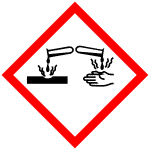
GHS05 |
|---|---|
| 信号词 | Danger |
| 危害声明 | H314 |
| 警示性声明 | P280-P305 + P351 + P338-P310 |
| 个人防护装备 | Faceshields;full-face respirator (US);Gloves;Goggles;multi-purpose combination respirator cartridge (US);type ABEK (EN14387) respirator filter |
| 危害码 (欧洲) | C |
| 风险声明 (欧洲) | 34 |
| 安全声明 (欧洲) | S26-S36/37/39-S45 |
| 危险品运输编码 | UN 3265 8/PG 2 |
| WGK德国 | 3 |
| 包装等级 | II |
| 危险类别 | 8 |
| 海关编码 | 2916399090 |
Synonym:Benzoyl chloride, 4-hexyl Section 2 - COMPOSITION, INFORMATION ON INGREDIENTS
Risk Phrases: 34 Section 3 - HAZARDS IDENTIFICATION EMERGENCY OVERVIEW
Causes burns.Moisture sensitive.Corrosive. Potential Health Effects Eye: Causes eye burns. May cause chemical conjunctivitis and corneal damage. Skin: Causes skin burns. May cause skin rash (in milder cases), and cold and clammy skin with cyanosis or pale color. Ingestion: May cause severe and permanent damage to the digestive tract. Causes gastrointestinal tract burns. May cause perforation of the digestive tract. May cause systemic effects. Inhalation: May cause severe irritation of the respiratory tract with sore throat, coughing, shortness of breath and delayed lung edema. Causes chemical burns to the respiratory tract. Aspiration may lead to pulmonary edema. May cause systemic effects. Chronic: Effects may be delayed. Section 4 - FIRST AID MEASURES Eyes: Flush eyes with plenty of water for at least 15 minutes, occasionally lifting the upper and lower eyelids. Get medical aid immediately. Do NOT allow victim to rub eyes or keep eyes closed. Extensive irrigation with water is required (at least 30 minutes). Skin: Get medical aid immediately. Immediately flush skin with plenty of water for at least 15 minutes while removing contaminated clothing and shoes. Wash clothing before reuse. Destroy contaminated shoes. Ingestion: Never give anything by mouth to an unconscious person. Get medical aid immediately. Do NOT induce vomiting. If conscious and alert, rinse mouth and drink 2-4 cupfuls of milk or water. Inhalation: Get medical aid immediately. Remove from exposure and move to fresh air immediately. If breathing is difficult, give oxygen. Do not use mouth-to-mouth resuscitation if victim ingested or inhaled the substance; induce artificial respiration with the aid of a pocket mask equipped with a one-way valve or other proper respiratory medical device. Notes to Physician: Section 5 - FIRE FIGHTING MEASURES General Information: As in any fire, wear a self-contained breathing apparatus in pressure-demand, MSHA/NIOSH (approved or equivalent), and full protective gear. During a fire, irritating and highly toxic gases may be generated by thermal decomposition or combustion. Water hydrolyzes material liberating acidic gas which in contact with metal surfaces can generate flammable and/or explosive hydrogen gas. Extinguishing Media: DO NOT USE WATER! Do NOT get water inside containers. In case of fire, use carbon dioxide, dry chemical powder or appropriate foam. Section 6 - ACCIDENTAL RELEASE MEASURES General Information: Use proper personal protective equipment as indicated in Section 8. Spills/Leaks: Absorb spill with inert material (e.g. vermiculite, sand or earth), then place in suitable container. Clean up spills immediately, observing precautions in the Protective Equipment section. Provide ventilation. Do not get water inside containers. Section 7 - HANDLING and STORAGE Handling: Wash thoroughly after handling. Remove contaminated clothing and wash before reuse. Do not get in eyes, on skin, or on clothing. Do not ingest or inhale. Do not allow contact with water. Use only in a chemical fume hood. Discard contaminated shoes. Keep from contact with moist air and steam. Storage: Store in a tightly closed container. Store protected from moisture. Store in a cool, dry area away from incompatible substances. Section 8 - EXPOSURE CONTROLS, PERSONAL PROTECTION Engineering Controls: Facilities storing or utilizing this material should be equipped with an eyewash facility and a safety shower. Use adequate ventilation to keep airborne concentrations low. Exposure Limits CAS# 50606-95-6: Personal Protective Equipment Eyes: Wear appropriate protective eyeglasses or chemical safety goggles as described by OSHA's eye and face protection regulations in 29 CFR 1910.133 or European Standard EN166. Skin: Wear appropriate protective gloves to prevent skin exposure. Clothing: Wear appropriate protective clothing to prevent skin exposure. Respirators: A respiratory protection program that meets OSHA's 29 CFR 1910.134 and ANSI Z88.2 requirements or European Standard EN 149 must be followed whenever workplace conditions warrant respirator use. Section 9 - PHYSICAL AND CHEMICAL PROPERTIES Physical State: Liquid Color: clear yellow Odor: none reported pH: Not available. Vapor Pressure: Not available. Viscosity: Not available. Boiling Point: Not available. Freezing/Melting Point: Not available. Autoignition Temperature: Not applicable. Flash Point: > 112 deg C (> 233.60 deg F) Explosion Limits, lower: Not available. Explosion Limits, upper: Not available. Decomposition Temperature: Not available. Solubility in water: Hydrolysis. Specific Gravity/Density: 1.0290g/cm3 Molecular Formula: C13H17ClO Molecular Weight: 224.73 Section 10 - STABILITY AND REACTIVITY Chemical Stability: Stable under normal temperatures and pressures. May decompose on exposure to moist air or water. Conditions to Avoid: Incompatible materials, moisture, contact with water. Incompatibilities with Other Materials: Moisture, water, alcohols, oxidizing agents, strong bases. Hazardous Decomposition Products: Hydrogen chloride, phosgene, carbon monoxide, carbon dioxide. Hazardous Polymerization: Has not been reported Section 11 - TOXICOLOGICAL INFORMATION RTECS#: CAS# 50606-95-6 unlisted. LD50/LC50: Not available. Carcinogenicity: Benzoyl chloride, 4-hexyl- - Not listed by ACGIH, IARC, or NTP. Section 12 - ECOLOGICAL INFORMATION Section 13 - DISPOSAL CONSIDERATIONS Dispose of in a manner consistent with federal, state, and local regulations. Section 14 - TRANSPORT INFORMATION IATA Shipping Name: CORROSIVE LIQUID, N.O.S.* Hazard Class: 8 UN Number: 1760 Packing Group: II IMO Shipping Name: CORROSIVE LIQUID, N.O.S. Hazard Class: 8 UN Number: 1760 Packing Group: II RID/ADR Shipping Name: CORROSIVE LIQUID, N.O.S. Hazard Class: 8 UN Number: 1760 Packing group: II Section 15 - REGULATORY INFORMATION European/International Regulations European Labeling in Accordance with EC Directives Hazard Symbols: C Risk Phrases: R 34 Causes burns. Safety Phrases: S 24/25 Avoid contact with skin and eyes. S 26 In case of contact with eyes, rinse immediately with plenty of water and seek medical advice. WGK (Water Danger/Protection) CAS# 50606-95-6: No information available. Canada CAS# 50606-95-6 is listed on Canada's NDSL List. CAS# 50606-95-6 is not listed on Canada's Ingredient Disclosure List. US FEDERAL TSCA CAS# 50606-95-6 is listed on the TSCA inventory. SECTION 16 - ADDITIONAL INFORMATION N/A |
|
~% 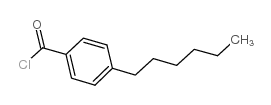
50606-95-6 |
| 文献:Kizner, T. A.; Mikhaleva, M. A.; Serebryakova, E. S. Chemistry of Heterocyclic Compounds (New York, NY, United States), 1991 , vol. 27, # 3 p. 313 - 315 Khimiya Geterotsiklicheskikh Soedinenii, 1991 , # 3 p. 386 - 388 |
|
~% 
50606-95-6 |
| 文献:Tinh; Pourrere; Destrade Molecular crystals and liquid crystals, 1980 , vol. 62, # 1-2 p. 125 - 139 |
| 上游产品 3 | |
|---|---|
| 下游产品 5 | |

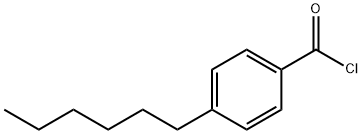
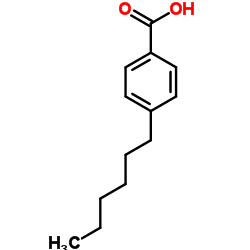
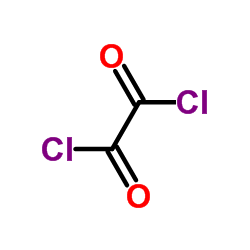
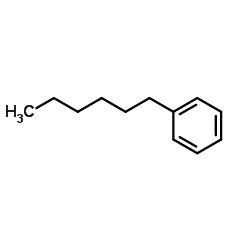
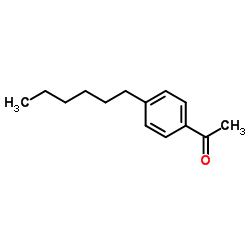
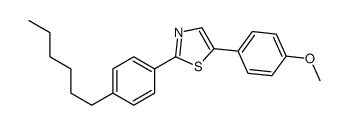
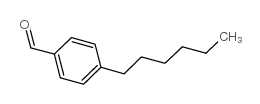
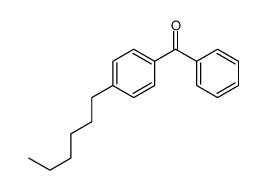
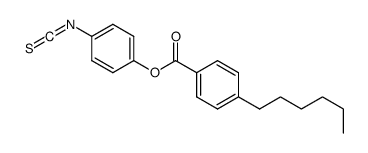





 浙公网安备 33010802013016号
浙公网安备 33010802013016号